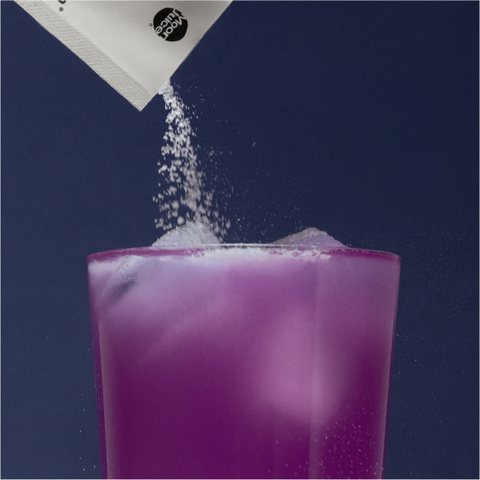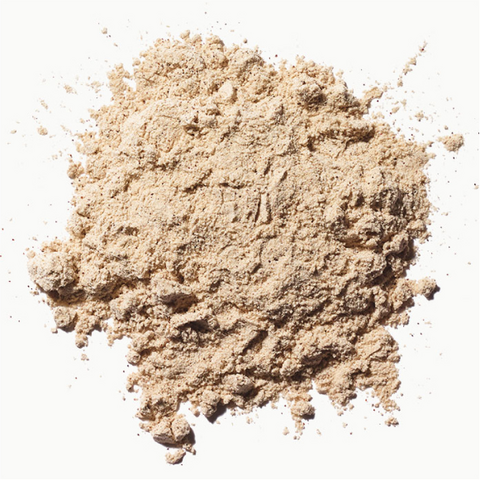Collagen and biotin have emerged as popular supplements for those in the pursuit of healthier skin, hair, and nails. While people may turn to these natural compounds for the same reasons, they actually work in distinct ways within the body. Because collagen and biotin are uniquely crucial for various bodily functions, understanding which one suits your larger health goals best is vital.
In this article, we'll explore the benefits of both supplements, highlight the key differences between biotin and collagen, and tackle the big question of which you should take. We'll also discuss the possibility of combining them for a comprehensive skin care approach and provide practical tips on incorporating these supplements effectively. By clearing up the collagen vs. biotin debate, you can curate your skin care supplement routine with confidence.
What is Collagen?
Collagen is the most abundant protein in the body. This fibrous protein forms the foundational structure of bones, cartilage, skin, tendons, organs, and tissues. In fact, it constitutes approximately 90% of the composition of your hair, skin, and nails.
The body's innate ability to produce collagen relies on a complex process that combines Amino Acids sourced from dietary proteins with essential nutrients like Vitamin C, Zinc, and Copper. However, as time passes and the body faces stressors, collagen naturally breaks down. Individuals who develop a collagen deficiency begin to notice unwanted side effects like hair thinning, brittle nails, and dull skin. This makes it essential to protect and preserve your body’s collagen through supplementation. Given its powerful role in skin health, collagen supplementation can enhance the vitality and overall well-being of the skin.
Benefits of Collagen
Collagen, often referred to as the body's structural glue, offers a wide range of unique benefits. This essential protein helps carry out multiple functions throughout the body, encompassing skin health, digestive well-being, as well as joint, bone, and muscle maintenance. Here's how collagen contributes to your skin and overall health:
Improves Skin Elasticity
One of collagen's remarkable benefits is its contribution to skin elasticity. This protein helps maintain the skin's ability to stretch and bounce back, ensuring that it stays taut and resilient.
Increases Skin Hydration
Collagen also plays a crucial role in skin hydration. It helps lock in moisture within the skin's layers, preventing dryness and promoting a supple and dewy complexion. As collagen levels naturally decline with age, the skin's ability to retain moisture diminishes as well. Collagen supplementation can help replenish and maintain optimal skin hydration.
Minimizes Fine Lines
Studies have consistently highlighted collagen's ability to reduce fine lines by increasing skin density. Collagen is considered a healthy ingredient for this reason.
Supports Hair and Nail Health
Collagen is a key player in hair growth and nail health. Taking collagen supplements daily has been shown to increase nail growth and improve brittle nails. This protein's benefits extend beyond the skin, nurturing the strength and vitality of both hair and nails.
Aids Digestive Health
Collagen supplementation has been linked to improved digestive health. It can reduce bloating and alleviate mild digestive symptoms, contributing to overall gut well-being.
Supports Muscle Growth & Maintenance
Collagen aids in muscle growth and maintenance, promoting muscle mass and strength. It can speed up muscle recovery time, indirectly boosting metabolism through enhanced muscle growth. Additionally, collagen has been shown to help regulate blood sugar levels, which is crucial for maintaining stable energy throughout the day.
Supports Joint & Bone Health
Collagen isn't just skin-deep — it extends its benefits to joint and bone health, too. Studies have shown that collagen supplementation can provide relief for sore knees and support overall joint mobility. Because it contributes to maintaining strong bones, it’s an essential component for bone health.
Over time, the natural decline in collagen production becomes more apparent. Supplementation offers a natural approach to replenishing dipping collagen levels, promoting well-rounded health benefits that extend far beyond the skin’s surface. Whether you're looking to preserve the health of your skin, support your joints, or enhance your overall well-being, collagen can help
What is Biotin?
Biotin, also known as Vitamin B7, is an essential nutrient in our diet. Unlike some compounds that our bodies can produce naturally, biotin can only be obtained through food or supplementation since our bodies lack the ability to synthesize it.
This water-soluble vitamin plays a key role in the body's metabolic processes. Biotin actively supports the metabolism of carbohydrates, proteins, and fats, helping convert them into the energy our bodies require for daily functioning. Meanwhile, biotin also produces the protein Keratin, which is one of the many proteins that make up hair, skin, and nails.
Benefits of Biotin
With its variety of health benefits, biotin plays a vital role in supporting the health of your hair, skin, and energy. Here's how a biotin supplement can help you look and feel your best:
Promotes Hair Growth
One of the notable benefits of biotin supplementation is its potential to promote healthy hair growth. While biotin supplementation is considered effective in addressing hair issues, it's most beneficial when biotin deficiency is the underlying problem. Studies have shown that low biotin levels were discovered in 38% of women experiencing hair problems. Biotin acts as a coenzyme for processes that support the maintenance of healthy hair, contributing to thicker-looking hair and overall hair health.
Supports Healthy Nails
Biotin doesn't stop at hair; it also supports healthy nail growth. In a study involving 32 women with varying nail strength who took biotin supplements for up to 15 months, results showed a 25% increase in nail thickness among participants with brittle nails.
Enhances Skin Hydration
Biotin's benefits extend to skin health as well. Research has found that biotin helps maintain skin hydration, contributing to a more supple and moisturized complexion. In a study involving 30 participants, biotin was shown to help skin maintain its hydration.
Regulates Oxidative Stress
Biotin has a role in helping regulate oxidative stress in the body. Oxidative stress can have detrimental effects on various bodily functions, so the antioxidant properties of biotin are beneficial in maintaining overall health.
Supports Energy Metabolism
Biotin plays a crucial role in converting the food we consume into the energy our bodies need to function. It is especially useful for breaking down fats, carbohydrates, and proteins, making it an essential cofactor for energy metabolism.
Biotin's multifaceted benefits, from supporting hair and nail health to contributing to overall energy, make it a valuable addition to your supplement regimen.
Key Differences Between Collagen and Biotin
Understanding the major differences between collagen and biotin is essential to selecting the right dietary supplement for your specific needs. Here’s how the two supplements compare:
Nature of the Compounds
Collagen is a type of protein, while biotin is a vitamin.
Your body naturally produces collagen to support various structures, including your bones, teeth, nails, and skin. Biotin, on the other hand, is primarily obtained from dietary sources, as the body itself does not produce this vitamin.
Production and Availability
Collagen is a structural protein that your body can produce on its own but decreases over time.
Biotin, in contrast, is not produced by the body itself but is synthesized by gut bacteria based on the food we eat.
Metabolic Functions
Collagen is one of the proteins that your body builds to provide shape and structure to various tissues and organs.
Biotin metabolizes the nutrients you consume for energy and is one of the many building blocks for protein synthesis.
Sign Up, Nerd Out
Get wellness tips, education, and recipes
delivered straight to your inbox.
Get wellness tips, education,
and recipes delivered
straight to your inbox.
Is Collagen Better Than Biotin?
When it comes to choosing between collagen or biotin, the decision largely depends on your specific health goals and personal needs. Both supplements offer unique advantages, and the choice between them should align with your desired outcomes.
Biotin for Targeted Support
Biotin particularly shines in the research as a supplement for individuals dealing with hair thinning or hair loss due to biotin deficiency. It plays a vital role in hair health and can be particularly effective in addressing hair issues when a deficiency is the underlying cause. However, it's important to note that biotin is a nutrient that can also be obtained through dietary sources. For some, simply adjusting their diet to include foods rich in biotin might be sufficient to meet their needs and support their hair, skin, and nail goals. Therefore, biotin supplementation may not always be essential, depending on your individual circumstances and nutritional habits.
Collagen for Multidimensional Health
On the other hand, there is a wide range of benefits of collagen for women and men, nurturing health from various angles. Collagen is not limited to hair and nail health but extends its positive impact to the skin, joints, and more. If your goal is to take a supplement that supports your overall well-being multidimensionally, collagen is an excellent choice.
Both liquid and powder collagen supplementation has been associated with improved skin elasticity, hydration, and reduced signs of aging. It supports joint mobility and bone health, making it indispensable for individuals looking to maintain an active and healthy lifestyle. Additionally, collagen aids in muscle growth and recovery, making it a versatile supplement for those focusing on fitness and muscle health.
Choosing Between Collagen and Biotin
The choice between a collagen and biotin supplement ultimately depends on your specific health and wellness objectives. If you're primarily seeking targeted support for hair or nail health and have a balanced diet rich in biotin sources, biotin supplementation may be ideal. However, if you're looking for a comprehensive supplement that nurtures your overall health — from skin to hair, joints, and more, a collagen supplement is a great option. Both supplements can play valuable roles in your wellness routine.
Can You Take Collagen and Biotin Together?
Yes! Combining collagen and biotin supplements allows you to harness the synergistic benefits they offer. Research has demonstrated that this supplement duo can lead to improved skin hydration, enhanced elasticity and smoothness, making it an ideal choice for those seeking comprehensive skin health support from the inside out. By taking a collagen and biotin supplement together, you can address both the structural and metabolic aspects of skin health.
How to Take Collagen
Supplementing collagen can be a simple and effective way to support healthy skin and overall well-being. Here are some essential steps to consider when incorporating collagen into your routine:
- Prioritize Quality: Look for a collagen product that offers traceable, unadulterated, and sustainably sourced ingredients. This ensures that you are getting the most beneficial and pure form.
- Check Dosage Recommendations: Be sure to follow recommendations provided on the product label, it’s possible to have too much of a good thing.
- Consume Consistently: Consistency is key when supplementing with collagen powder or liquid collagen to achieve maximum benefits.
Collagen Protect® is a vegan collagen creamer and skin supplement to help protect and preserve your natural collagen.* It combines Hyaluronic Acid (to support collagen synthesis and reduce the appearance of fine lines), Silver Ear Mushroom (to support the skin barrier and promote deep skin hydration), and Tocos (to protect collagen and prevent visible signs of aging). Wondering how to use this collagen powder? We recommend taking 1 rounded tsp of this collagen supplement per day to reap its full benefits.
Takeaways
The choice between collagen and biotin hinges on your unique health goals, and both supplements offer distinct advantages. Collagen, a structural protein, provides comprehensive support not only for skin, hair, and nails but also for joint, muscle, and digestive health, making it an excellent choice for overall well-being. On the other hand, biotin can support skin health but really excels in addressing hair concerns, particularly when deficiency is the root cause. While these supplements can be taken individually, their combined use can yield synergistic benefits, enhancing skin health from the inside out. With a clearer understanding of collagen and biotin, you can confidently create a skincare supplement regimen that aligns with your larger health goals.
Sources
- National Library of Medicine, Collagen peptide supplementation in combination with resistance training improves body composition and increases muscle strength in elderly sarcopenic men: a randomized controlled trial https://www.ncbi.nlm.nih.gov/pmc/articles/PMC4594048/
- National Library of Medicine, Effect of a Daily Collagen Peptide Supplement on Digestive Symptoms in Healthy Women: 2-Phase Mixed Methods Study https://www.ncbi.nlm.nih.gov/pmc/articles/PMC9198822/
- National Library of Medicine, Oral supplementation with specific bioactive collagen peptides improves nail growth and reduces symptoms of brittle nails https://pubmed.ncbi.nlm.nih.gov/28786550/
- National Library of Medicine, Collagen Supplements for Aging and Wrinkles: A Paradigm Shift in the Fields of Dermatology and Cosmetics https://pubmed.ncbi.nlm.nih.gov/35223163/
- National Library of Medicine, Biotin https://www.ncbi.nlm.nih.gov/books/NBK554493/
- National Library of Medicine, A Collagen Supplement Improves Skin Hydration, Elasticity, Roughness, and Density: Results of a Randomized, Placebo-Controlled, Blind Study https://www.ncbi.nlm.nih.gov/pmc/articles/PMC6835901/
- National Library of Medicine, Oral Collagen Supplementation: A Systematic Review of Dermatological Applications https://pubmed.ncbi.nlm.nih.gov/30681787/
- National Library of Medicine, Effects of hydrolyzed collagen supplementation on skin aging: a systematic review and meta-analysis https://pubmed.ncbi.nlm.nih.gov/33742704/
- Cleveland Clinic, Collagen https://my.clevelandclinic.org/health/articles/23089-collagen
- National Library of Medicine, Collagen Supplements for Aging and Wrinkles: A Paradigm Shift in the Fields of Dermatology and Cosmetics https://www.ncbi.nlm.nih.gov/pmc/articles/PMC8824545/
- National Library of Medicine, Serum Biotin Levels in Women Complaining of Hair Loss https://www.ncbi.nlm.nih.gov/pmc/articles/PMC4989391/
- National Library of Medicine, Oral Intake of Low-Molecular-Weight Collagen Peptide Improves Hydration, Elasticity, and Wrinkling in Human Skin: A Randomized, Double-Blind, Placebo-Controlled Study https://www.ncbi.nlm.nih.gov/pmc/articles/PMC6073484/














